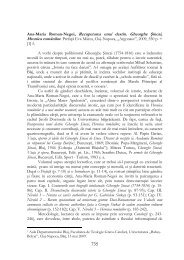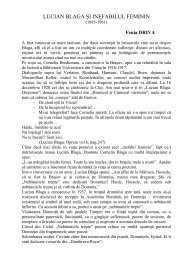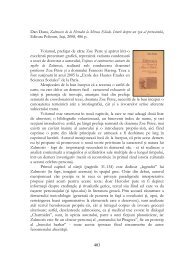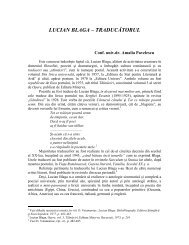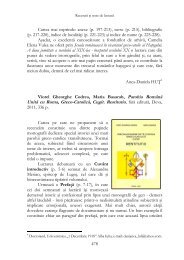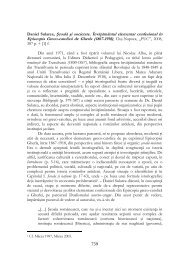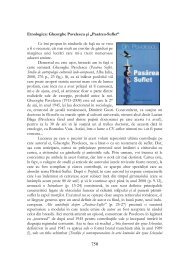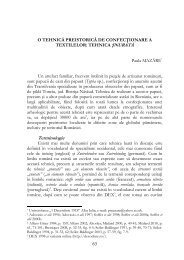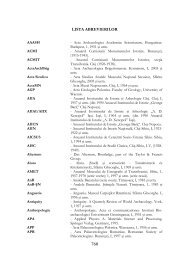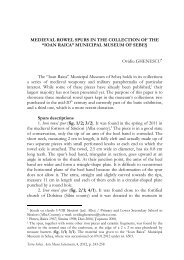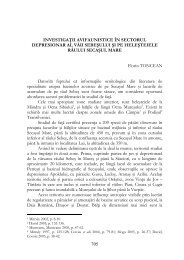POLITICA EXTERNÄ A ROMÃNIEI 1920-1940 (II) - Centrul Cultural ...
POLITICA EXTERNÄ A ROMÃNIEI 1920-1940 (II) - Centrul Cultural ...
POLITICA EXTERNÄ A ROMÃNIEI 1920-1940 (II) - Centrul Cultural ...
Create successful ePaper yourself
Turn your PDF publications into a flip-book with our unique Google optimized e-Paper software.
Sorin Arhire<br />
shock to Romanian leaders because fundamental to the policy they constructed was the<br />
irreducible opposition between Nazism and Communism.<br />
At the outbreak of the Second World War Romania officially proclaimed its<br />
neutrality in the Privy Council of 6 September. The same direction was followed also after<br />
17 September when the Soviet troops entered Polish territory and, according to the Treaty<br />
of 1921, Romania had to step in for its ally.<br />
German victories of May <strong>1940</strong> made Carol <strong>II</strong> radically change Romanian foreign<br />
policy. With the French-British guarantees standing in his way rather than aiding him, King<br />
Carol began to lose faith in the victory of the allies and considered that Romania’s only<br />
chance to secure its territory was to near the Third Reich. Grigore Gafencu, who was<br />
identifying himself far too much with a foreign policy oriented towards France and Great<br />
Britain, was thus replaced on 1 June with Ion Gigurtu, a well-known Germanophile.<br />
Romania’s ambiguous game was put to an end by the fast defeat of France by the Germans<br />
and, in the eleventh hour, it sought the good-will of Germany hoping to thus save the<br />
territorial integrity of Greater Romania.<br />
After the territorial losses to the Soviet Union, Romania did not spare any effort to<br />
win favour with Hitler. This eleventh hour attempt was in fact a desperate measure to<br />
prevent other territorial losses that were already looming. On 1 July, without even<br />
announcing the British, Romania gave up the guarantees received in April 1939 and on 4<br />
July a pro-German government run by Ion Gigurtu having Mihail Manoilescu as Minister<br />
of Foreign Affairs and Horia Sima at the Culture Ministry, was formed. It was too late,<br />
however, as Romania was forced to comply with losing the greatest part of Transylvania to<br />
Hungary and South Dobrogea to Bulgaria.<br />
The government formed on 4 September under the leadership of General<br />
Antonescu had only the support of the Legionary Movement because neither the National<br />
Peasants’ Party nor the National Liberal Party wanted to associate its name with a<br />
dictatorial regime oriented exclusively towards the Axis. Furthermore, the leaders of both<br />
parties continued to believe England would have the final victory. Although known<br />
Anglophile and Francophile, Ion Antonescu imposed a pro-German orientation and was<br />
the one to sign Romania’s official accession to the Tripartite Pact on 23 November <strong>1940</strong> in<br />
Berlin.<br />
By joining the Axis Romania ended its foreign policy oscillations. The political<br />
leaders in Bucharest decided to join Germany because in <strong>1940</strong> it was the only power able to<br />
protect the Romanian territory from a new Soviet aggression. At the same time, by<br />
maintaining a close economic and military cooperation with the Reich, the Romanian<br />
government led by Ion Antonescu aimed at winning Hitler’s goodwill and obtaining the<br />
cancellation of the provisions of the Vienna Award. Thus, although almost throughout the<br />
interwar period it had a strong attachment to the two great democratic powers of Western<br />
Europe, France and Great Britain, Romania went on Germany’s side because of the<br />
situation in Europe at that time, out of opportunism and also necessity.<br />
Abrevieri bibliografice<br />
ANRDANIC<br />
Arh. MAE<br />
- Arhivele Naţionale ale României. Direcţia Arhivele<br />
Naţionale Istorice Centrale.<br />
- Arhivele Ministerului Afacerilor Externe ale României.<br />
316



